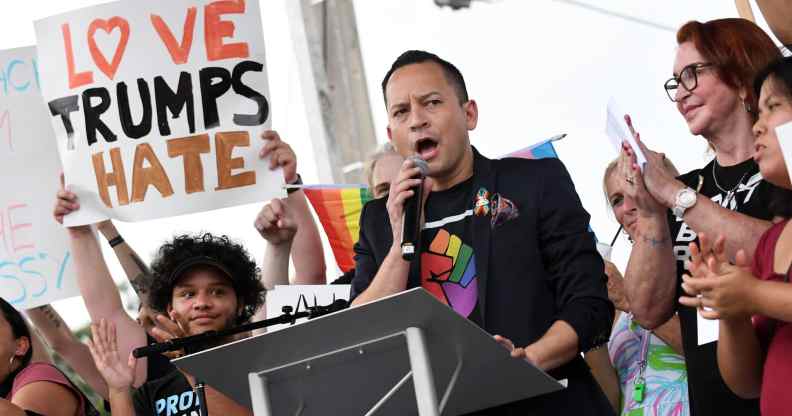Florida’s reviled ‘Don’t Say Gay’ bill passes final committee hurdle, inching closer to reality

Carlos Guillermo Smith, Florida House District Representative. (Gerardo Mora/Getty Images)
Florida’s chilling “Don’t Say Gay” bill that activists say demonises LGBT+ people has passed its final state Senate committee, paving the way for a Senate vote.
SB 1834, known as the Parental Rights in Education bill, was passed by House committee members in January.
Under the House bill, a Florida school district “may not encourage classroom discussion about sexual orientation or gender identity in primary grade levels or in a manner that is not age-appropriate or developmentally appropriate for students”.
The measure doesn’t specify how “age-appropriate” and “developmentally appropriate” would be defined, but would give parents and guardians the power to sue schools they believe violate the proposals.
Activists have warned the bill would make LGBT+ rights and lives a “taboo topic” in schools, akin to Britain’s Section 28 and Russia and Hungary’s so-called “gay propaganda bills”.
And on Monday (28 February), the state’s Senate Appropriations Committee passed it by a vote of 12 to eight, The Hill reported.
If the Senate approves the bill, with a vote expected in the coming week, it will land on fiercely anti-LGBT+ governor Ron DeSantis‘ desk to be signed by the summer.
Against the backdrop of rising Republican rancour over LGBT+ rights, where right-wing legislators have rolled out at least 160 anti-LGBT+ bills, the bill’s sponsors said their sinister proposals are anything but homophobic.
“I am really amazed at how something so simple turned into this,” said senator Dennis Baxley during the hearing. “I’m not trying to demonise anybody, I’m not trying to negate the values of teachers.”
And as supporters preached about “parental rights,” they silenced LGBT+ voices. Democratic representative Carlos Guillermo Smith, Florida’s first LGBT+ Latino legislator, reportedly marched out of the committee hearing after chair Kelli Stargel stopped him from providing public testimony.
Representative @CarlosGSmith — an @equalityfl hero — marches out of the Florida Senate Appropriations Committee Hearing after Chair @kellistargel still refuses to allow him to offer public testimony against the #DontSayGay Bill. pic.twitter.com/SmzKjtO1Gz
— Kevin Cho (@KevinChoFL) February 28, 2022
“The censorship of LGBTQ Floridians is unprecedented,” tweeted Smith. “We will not be silenced.”
Smith claimed he had been “blocked” by Stargel despite filling out public comment cards. “I have just as much a right as any other person to speak out against this dangerous legislation,” he added.
“I am appalled by the censorship we continue to see from the Florida legislator. LGBT+ Floridians are a healthy and normal part of our schools and our society.
The Chair of the Senate Committee hearing #DontSayGay just blocked me from being able to provide public comment on the bill AND on the @JeffreyBrandes amendment to improve it. The censorship of LGBTQ Floridians is unprecedented. We will not be silenced. 🏳️🌈 https://t.co/hAkpCAj52a— Carlos Guillermo Smith (@CarlosGSmith) February 28, 2022
“And this bill sends a terrible message to our youth that somehow conversations about us and about LGBTQ Floridians in the classroom are dangerous – they are not dangerous.”
Hope for Smith came from an amendment that softened the language of the bill. Republican senator Jeffrey Brandes on Friday proposed to swap out the words “sexual orientation or gender identity” for “human sexuality” to make the plans more about sex and relationships education.
Speaking on a House Democratic Caucus press conference call Monday, Smith endorsed the amendment and added: “The amendment substantially deescalates the public opposition to this bill, and it makes the bill no longer about targeting LGBTQ people for erasure in our schools.
“It’s just a bill about sex ed and which grades are appropriate for that conversation and which grades are not.”
But appropriations committee members saw otherwise, with Brandes’ buffer failing to pass along party lines.
“Republicans are in the majority, both in the Florida House and the Florida Senate, and they occupy the governor’s mansion as well,” Smith told GAY TIMES.
“So the numbers as far as the votes are stacked against us, but we have people power. The public is on our side. A majority of Floridians oppose this proposal that seeks to censor conversations about LGBTQ people in our schools.
“It’s not solving any problem that currently exists.”

